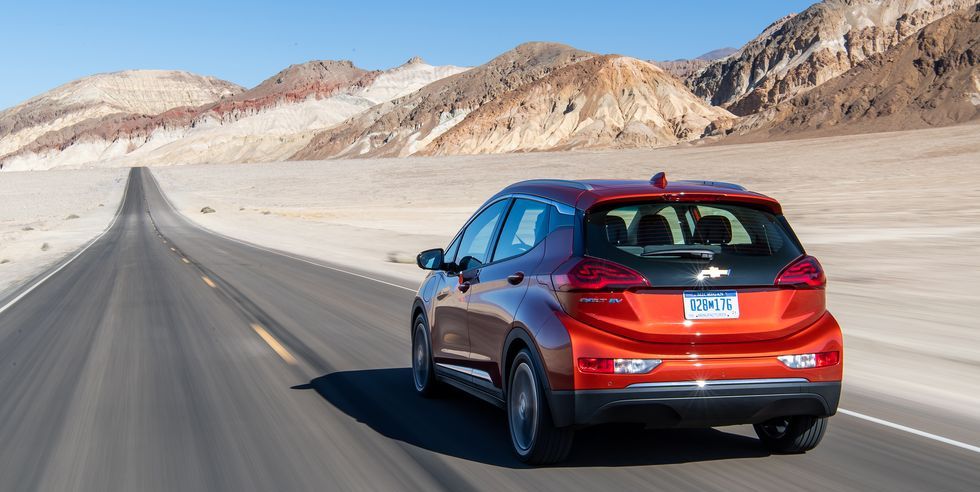GM Refund on Chevrolet Bolt EVs Comes with a Catch: You Must Waive Right to Sue

Jessica Lynn WalkerCar and Driver
All Chevrolet Bolt and Bolt EUV vehicles were recalled in 2021 because of battery fire risk, following nearly a year of smaller related recalls. After the recall, GM cut prices on the Bolts for the 2023 model year, and announced that customers who’d bought their vehicles earlier were eligible for a refund.On August 2, Jalopnik showed a screen shot of the rebate form, sent to the website by a Bolt owner, in which they spotted fine print that said the owner must agree to waive their right to sue over their “vehicle(s), the battery defect, or the battery recalls.”
The saga of the Bolt EV and EUV has been dramatic in the past year. First, there were sweeping battery fire recalls, and then production was halted, and then there was a hefty price cut with refunds for owners who’d bought before the announcement, bringing the EVs’ starting price under $30,000. Now it appears—and the automaker has confirmed to Car and Driver—that Chevrolet is offering the refund on the condition that owners waive their right to sue GM over their vehicle, battery defects, or battery recalls.
The report comes from an unnamed source cited in an article on the Jalopnik website, published Tuesday morning. The source, described as a Bolt owner, claims they had to agree to fine print with that stipulation in order to claim their refund.
The article includes a screenshot of the release the source had to click to agree to before finalizing the reimbursement. The exact language, with certain parts bolded for emphasis, is as follows:
By nonetheless agreeing to this Release, I—both on my own behalf and on behalf of my heirs, agents, servants, beneficiaries, legal representatives, assigns, wards, executors, successors, and administrators—forever waive and release all claims, damages, or causes of action, either known or unknown, regardless of the legal or equitable theory, that I may have now or in the future arising out of or in any way relating to my Bolt vehicle(s), the battery defect, or the battery recalls, and including any claims or rights that I may have in connection with the class action, including any right to participate as a class member. This release is in favor of and includes General Motors Company, General Motors LLC, General Motors Holdings LLC, LG Chem, Ltd., LG Energy Solution, Ltd., LG Energy Solution Michigan Inc., LG Electronics, Inc., and LG Electronics USA, Inc. as well as all of their respective officers, directors, agents, employees, servants, subsidiaries, affiliated companies, subsidiaries, parent companies, insurers, authorized dealers, suppliers, divisions, predecessors, successors, heirs, and assigns.
Car and Driver reached out to GM for comment, and Kevin Kelly, senior director of Chevrolet Communications, confirmed to us that the above language is in the reimbursement agreement.
The History
In November 2020, Chevy recalled all 2017–2018 model Bolts and select 2019 models totaling 50,932 vehicles. The recall followed an investigation by the NHTSA into three reports of fires, including one which reported smoke inhalation injuries. NHTSA then issued a consumer alert warning Bolt owners of five known fires, including two injuries and one incidence of fire spreading to a home. The alert recommended Bolt owners park their vehicle outside away from buildings, and a series of temporary remedies were recommended.

Chevrolet Bolt battery unit.
Chevrolet
More Bolt EVs, and eventually the Bolt EUV, were recalled until the NHTSA announced in August 2021 that every 2017–2022 model year Bolt and Bolt EUV ever produced and sold was under recall, including vehicles that had previously received a remedy. This affected more than 141,000 vehicles.
GM committed to replacing every defective battery pack, and though it identified two potential manufacturing defects, GM held off on replacing battery packs until it could be sure that the new packs wouldn’t be defective.
The company also halted production on new Bolts and Bolt EUVs, having already halted production of new batteries. However, slowly but surely, GM began the process of replacing defective batteries, with production of batteries resuming in late 2021 and production of Bolts resuming in April 2022.

Pre-production for the 2017 Chevy Bolt EV.
Chevrolet
Meanwhile, prices had been cut for the 2022 model year, and, after production resumed, the Bolt EV and EUV got an additional price cut for 2023 of around $6000, announced in June. Both models now retail for under $30,000. Automotive News also noted that same month that owners who had purchased a Bolt EV earlier in 2022 would receive retroactive refunds totaling the price cut.
It’s worthwhile noting that the fine print of the agreement doesn’t say anything about your ability to file insurance claims. Equally important, GM is still legally required to provide no-cost repairs for any future recalls. That means if the Bolt you bought is eligible for a battery pack replacement, you can still get one. And, as always, owners can check the NHTSA recall site for more information and updates on their vehicle’s recall status.

This content is created and maintained by a third party, and imported onto this page to help users provide their email addresses. You may be able to find more information about this and similar content at piano.io



